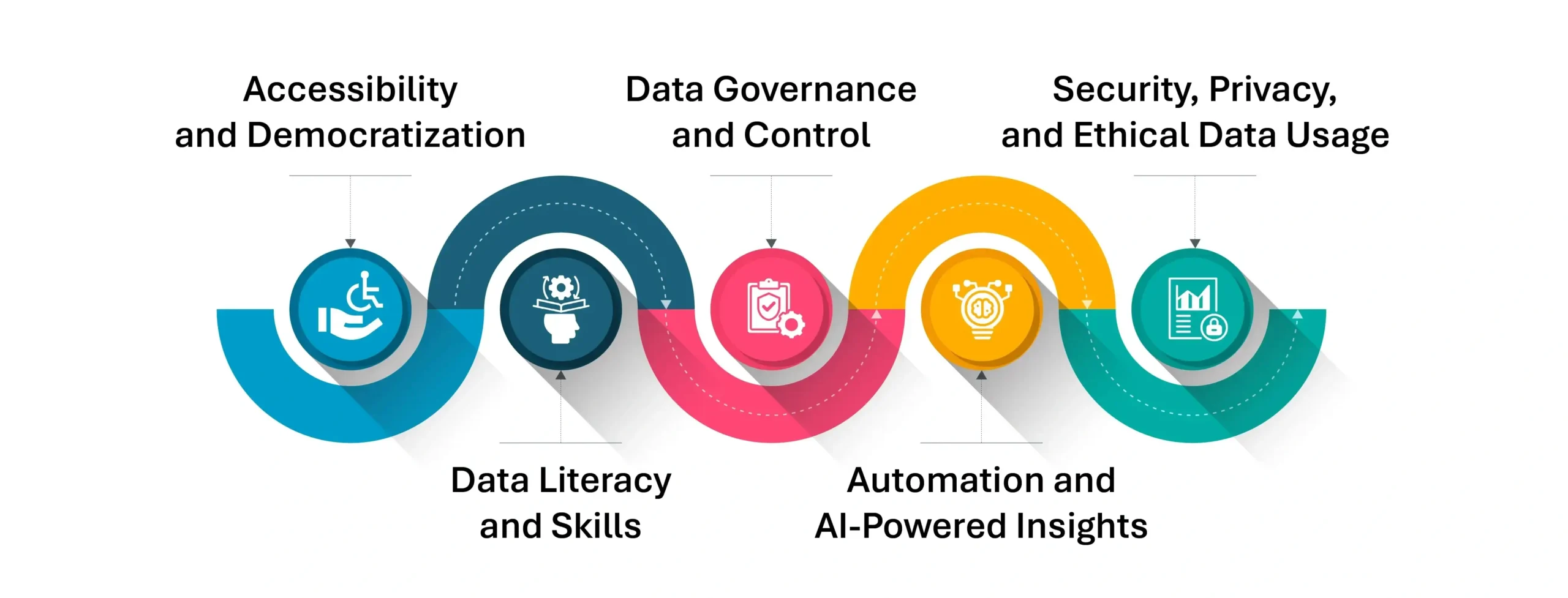What is Data Empowerment?
Data empowerment refers to the process of enabling individuals, teams, and organizations to take control of their data, leverage it effectively, and make informed decisions. It goes beyond just providing access to data; it focuses on ensuring that users have the right tools, skills, and governance frameworks to use, analyze, and act on data responsibly.
Key Aspects of Data Empowerment


- Accessibility & Democratization
- Ensuring that the right stakeholders have easy and secure access to data when they need it.
- Self-service data management allows employees, customers, and partners to access and utilize data without relying on IT teams.
- Data Literacy & Skills
- Training employees and decision-makers to understand, interpret, and leverage data effectively.
- Empowering non-technical users to interact with data without requiring deep technical expertise.
- Data Governance & Control
- Implementing policies and frameworks that balance data access with security and compliance.
- Role-based access control (RBAC) ensures that users can only access and modify data they are authorized for.
- Traceability and auditability enhance accountability in data usage.
- Automation & AI-Powered Insights
- Leveraging AI and machine learning to derive actionable insights from structured and unstructured data.
- Using predictive analytics to identify trends, risks, and opportunities proactively.
- Security, Privacy, & Ethical Data Usage
- Ensuring that data privacy laws and ethical guidelines are upheld in data usage.
- Data sovereignty and localization policies are respected, especially in regulated industries like finance and healthcare.
Why is Data Empowerment Important?
- Enhances Decision-Making and Business Growth
Organizations that empower employees with real-time data access and AI-driven insights can make faster, data-driven decisions. This reduces reliance on IT teams for everyday data tasks, allowing CXOs, analysts, and business leaders to act quickly. In industries like finance and healthcare, data-driven decision-making improves risk assessment, fraud detection, and patient outcomes, leading to higher efficiency and better business growth.
- Improves Security, Privacy, and Compliance
With growing regulatory pressures, businesses must enforce strong governance over their data. Data empowerment ensures that enterprises comply with regulations like GDPR, HIPAA, and the DPDP Act by implementing automated data classification, access controls, and traceability. It also enhances security by detecting and mitigating risks in real-time, preventing unauthorized access and potential data breaches.
- Drives Innovation and AI Adoption
AI and machine learning require high-quality, structured, and well-managed data to function optimally. By empowering employees with access to clean and contextualized data, businesses can improve AI model accuracy, automate workflows, and unlock new revenue streams. In industries like retail and manufacturing, AI-powered insights help optimize inventory, predict trends, and improve operational efficiency.
- Boosts Productivity and Collaboration
Data empowerment eliminates bottlenecks caused by siloed and inaccessible data, allowing teams across different departments to collaborate efficiently. With self-service data access, employees can generate reports, analyze trends, and make informed decisions without waiting for approvals. This not only speeds up operations but also fosters a culture of data-driven problem-solving and innovation within organizations.
- Builds Trust and Transparency
When businesses prioritize ethical data usage and governance, they create a foundation of trust with customers, employees, and regulatory bodies. Transparency in data access, usage, and compliance fosters accountability, reducing risks of misuse. This is especially important in sectors like government and finance, where public trust and regulatory adherence are critical to long-term success.
Getting Started with Data Dynamics:
- Read the latest blog: From Burden to Breakthrough: How Data Governance Fuels AI, Trust, and Business Growth in 2025 and Beyond
- Learn about our Unstructured Data Management Software – Zubin
- Schedule a demo with our team






